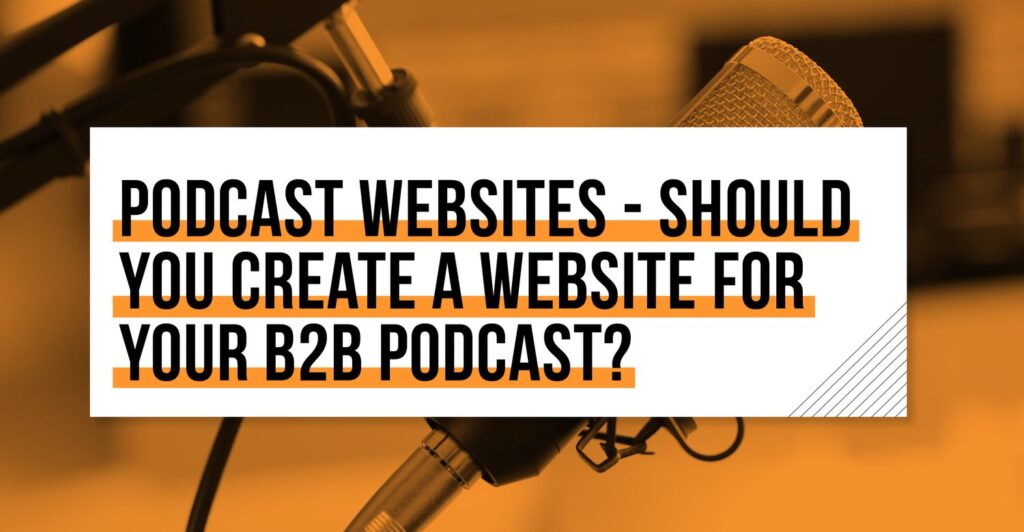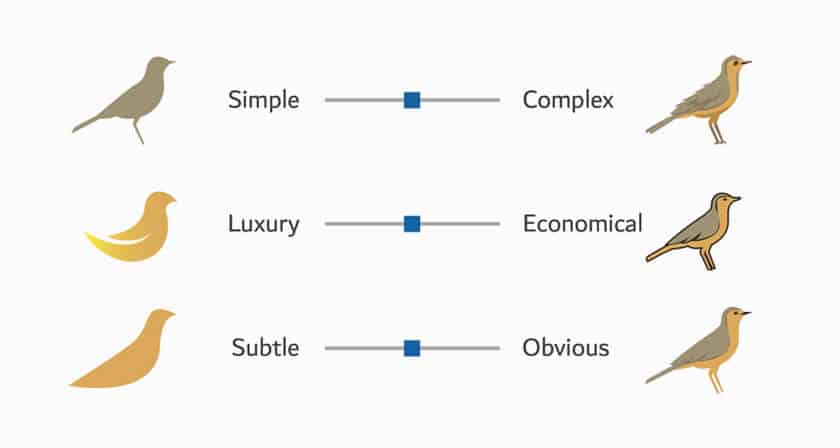If you’re starting a B2B podcast, you may be faced with a seemingly impossible number of logistical questions surrounding your new show. More often than not, these questions have nothing to do with interviewing thought leaders in your industry.
One question that may have come to mind is, “Should I build a standalone podcast website or a podcast page on my company website?”
If you were starting a B2C podcast the answer would almost certainly be yes. But that question changes when related to a B2B podcast. The answer could be either or both, depending on your situation.
Should I Build a Dedicated Website for My Podcast?
There are many good reasons why you might want to build your own podcast website for your B2B podcast.
Building a website is a great way to make your podcast its own media entity or even a brand within your industry that is separate from your company identity. This can be especially effective when using your podcast for account-based marketing (ABM), networking and/or relationship-building within your industry.
Also, the size of your company is important when it comes to promoting and driving traffic to your podcast. If your company is young, small or hasn’t invested much in SEO for your website, a standalone site will probably be the best choice.
Account-Based Marketing and Networking Through Podcasting
If part of your strategy is ABM, having your podcast as its own media outlet can help secure top guests in your industry who wouldn’t have agreed to be on your company podcast. You get the benefits of creating a media brand without having to create a new company and you can choose whether to sponsor it or not.
An example would be the Hospitality Leaders podcast, powered by Upshift. This podcast is owned by Upshift, a company in the hospitality industry. By creating a podcast brand, Hospitality Leaders, they have been able to secure some of the top leaders in the industry who want to be part of the Hospitality Leaders podcast.
Would they have wanted to be involved in the Upshift Hospitality podcast? Maybe, but it has been proven time and again that in cases like this, having a separate, compelling brand with its own homepage works better for the show.
Think of it this way, by creating a branded podcast within your industry, you are in fact creating a new trade publication that publishes interviews in an audio format. This is much more appealing for busy executives.
Company Size Matters in B2B Podcasting
A second factor to consider is the size of your company. Large, well-established enterprises can spin a new podcast up and immediately get ranked on search engines to generate downloads.
These companies have instant name recognition within their industry, sometimes even nationally or globally. Presumably, they have spent a lot of time and money over many years driving traffic to their site through SEO efforts and other marketing platforms.
These companies may have thousands, even millions, of subscribers to their newsletters, countless followers on their social media outlets and massive traffic to their website. Their brand alone is strong enough to drive traffic to their podcast.
If your company is relatively big within your industry, has been around a long time and invested in SEO, there is a simple way to determine whether you should start a standalone site: Check your Domain Authority (DA).
The DA score of your website determines the probability of landing in search results for certain subject matters or industries. It is a score from 1 – 100 that predicts your relevance in the industry according to Google.
If your DA is 40 or below, creating a new brand and website for your B2B podcast is probably the way to go.
Is Building A Dedicated B2B Podcast Website Difficult?
Building a standalone website for your business podcast is easy. It can be done using any of the basic website-building tools available on the market today such as Squarespace, Wix, or WordPress. Using a service with drag-and-drop tools allows you to spin up a website quickly on your own. Otherwise, you can hire a designer or a B2B podcast agency to make yours one of the best podcast websites in the industry.
Whether you do your own design or have someone else do it, when it comes to embedding your podcast, the process is pretty straightforward. Think of a podcast website as a standalone blog website. Every podcast episode is like an individual blog post. Embedding a podcast episode on your post is equivalent to embedding a YouTube video on a blog post.
When Should I Publish My B2B Podcast on My Company Website?
Publishing a B2B podcast on a company website is a great way to get the word out about the show. It can drive downloads for large enterprise companies and brands that are familiar within an industry. But what about an established, mid-sized company that has a decent amount of traffic to its website?
The best metric for that decision is your website’s Domain Authority. If your DA is above 40, there are many strategic reasons why publishing on the company website makes sense. A score of 40 or higher indicates that you’re a trusted authority in your industry, you’re providing useful information on a regular basis and you already have a decent amount of traffic.
Most large companies will put their podcast(s) under the resources or insights section. It is often here where blogs, seminars and case studies are posted.
When companies launch a podcast onto their resources page (or podcast home page on their site) oftentimes they will simply reproduce the blog page or the webinar page and convert it into a podcast home. This keeps the branding in place without creating unnecessary design work.
Getting the Most Out of Your Enterprise Podcast
Your podcast will reap the benefits of being posted on your company website by having immediate visibility and a built-in source of traffic, but don’t just post it and forget it. You can leverage that podcast content to elevate your online presence, strengthening your position as an industry leader even further.
Take Advantage of the SEO Opportunities
Most enterprise organizations know the value and importance of continuous SEO efforts. A recurring podcast, whether it’s weekly, bi-weekly or monthly, provides a treasure trove of industry-specific content for the SEO team to sink their teeth into.
Every podcast should have at least one comprehensive, keyword-rich article derived from the conversation in the episode. Ideally, each episode should yield several SEO articles. A 20-40 minute industry-specific conversation between thought leaders is a content creator’s dream.
By converting the episode content into articles, you get a search boost that audio alone won’t give you. With proper strategy, these articles can lead to direct traffic from industry-related search queries. Don’t miss out on your opportunity to use this rich SEO content to increase traffic and downloads.
Increase Your Backlinks
A podcast published on a company website creates a great opportunity to add credible backlinks.
A backlink, also known as an external link, is simply a link that points back to your website. Attention to backlinks in search results is what catapulted Google to the head of the pack when search engines were just starting out. Google decided that websites that had the most external links pointing back to them must have the most important content.
In the world of backlinks and SEO, the most important factor is trust. When people figured out the importance of backlinks, they began using shady methods, like link farms and hidden links, to get backlinks. Now those links only boost your visibility if they come from a trusted, credible source.
Thought leaders in your industry who appear on your podcast certainly qualify as trusted, credible sources. After each episode, ask your guest to link back to your podcast page. Most are more than happy to do so.
Even better make it so easy for your guest to promote the show that they can’t say no. Provide them with social posts that include links. Offer to write unique SEO articles to appear on their website that link back to your podcast page. People enjoy promoting themselves and they (or their marketing team) will almost always oblige.
Potential Roadblocks
Navigating the corporate approval ladder to get a podcast included on an enterprise-level website can be challenging. These roadblocks and bottlenecks can be frustrating when it comes to launching your website.
Embed Code Are Not Always Allowed
Some companies have a strict policy against putting embed codes on the company website. While it’s not ideal, the workaround, in this case, is pretty straightforward. Publish everything you would publish without the restriction, show notes, SEO articles, graphics, without the embedded podcast. In the post you can include links to listen on Apple and listen on Spotify, directing your visitors to listen from an external source.
Enterprise organizations can be like a battleship – they get things done but if you need to make an unscheduled turn it may take a while. You might get enthusiastic approval for your podcast, which is great, but then it might be followed by, “The web team can start working on it in six-to-nine months.”
Don’t let that stop you from launching your podcast. Spin up a standalone website for the podcast and publish it there. You can get started on your project, get some experience under your belt, start promoting and establishing your show as a voice in the industry. When the podcast page is ready, you’re ready to hit the ground running.
When The Answer is No
Sometimes your request to have the podcast hosted on the company site will be denied. This does not stop your B2B podcast before it starts. In this case, you’ll have no choice but to create a standalone entity for your show.
The Secret Sauce: The Best of Both Worlds
Starting a podcast on a dedicated, standalone site could be your first choice or your last resort, but sometimes it can be part of a strategy that is the best of both worlds.
You may start with a standalone site, but things can change and there are strategic ways to adapt to those changes. Maybe your company experiences explosive growth and you want to take advantage of your newly improved domain authority. Or, after months of waiting, your corporate web team completed a permanent home for your show. Or your company, which said no at the beginning, changes its mind after seeing the value your podcast is generating.
In cases like these, don’t ditch the original, dedicated site. You worked hard to design, launch and promote that site to build traffic and gain subscribers. There is a way to let your podcast live in both places without getting penalized by search engines for duplicate content.
Let’s be clear, you don’t have to use this secret sauce option as a fix for past problems. You can use it from the beginning and with powerful results.
A standalone website turns your podcast into your own voice within the industry, like a trade publication. This helps with guest scheduling and your overall positioning as a thought leader. Your company website provides the SEO and related traffic benefits that come with an established website.
When you combine the two, you get both benefits. But if you do this, you must de-index your standalone website from Google. This code basically tells Google to ignore your site and not include it in search results.
Why is this important? It avoids duplicate content. Search engines don’t like it when duplicate content is published in different places, and it will often punish both sources in the rankings where this happens. By de-indexing your standalone page, you can use the same content in both places without fear of being penalized.
Top 19 Podcast Websites
This content was originally published here.


